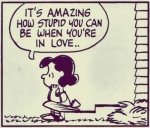saga d’amour conclut
When you fall in love, it’s like you get on a moving train with your lover, and you glide across the fruited plains and want for nothing. Everything is beautiful, and you believe that it will never change. Suddenly, you find yourself in the foothills, then on the dangerous mountain roads. You’re no longer on a train, and there’s no one else around. You’re alone with your simple need, one that your lover can no longer fulfill. You don’t know when—let alone why—everything changed. Despite the rarefied mountain air, you discover that Love is Flat, like the earth once felt. And you fall off the edge, as millions have done before you.
Now that the relationship is over, I risk sounding merely delusional, a victim of my own fantastical tendencies… as if I made the whole thing up, as if she was the level-headed one all along, humoring me while keeping my intense feelings at bay. There really ought to be a fairytale—told by the Grimm Sisters, perhaps—in which a Lesbian falls in love with a beautiful Princess (who is, of course, heterosexual; did you ever hear of a dyke Princess?). It’s a classic story, but, like many other women’s stories, it was never written down, or passed down orally. Ahem. This fairytale, if it existed, would not have a happy ending. And to be a bona fide fairy tale, a happy ending is a must—as is the inclusion of a Man to rescue the damsel from whatever horror results from not being with a Man. We lesbians have to rescue ourselves, or die trying.
My story doesn’t include a Man, unless you consider the male character who stands to the side of the stage, unaware of what is going on emotionally between his Woman and the never-seen Lesbian. I’m surprised Shakespeare never wrote this story. Or maybe he did and I missed it, having gotten a D in Shakespeare in college. (I had a lost year but was redeemed after I dropped out and started smoking marijuana. True story.)
There were certainly moments when it seemed that I—as the bona fide lesbian in the situation—was doomed or assumed to be the One in Love. But I know that she felt the same for awhile, which is what distinguished the relationship from my past encounters with unobtainable women. Oh sure, she was unobtainable, but there was a beautiful (delusional) time when we were together in the same matrix of wish and desire.
requiem for a mad, mad, mad, mad love
When love is not madness it is not love.―Pedro Calderón de la Barca
Friendship is solid. That’s its nature. It can take many forms: years long, or situational. Situational friendship ends when the situation is over. Usually, this is understood by both parties. Situational friendship can reconstitute itself if the new situation allows it, or it can fade from lack of contact. Years-long friendship changes to love naturally, over time, but it is still solid.
Romantic love is volatile. Most such love is doomed to failure, unless both parties allow it to change its form.
Madness is volatile. If one person emerges from the madness and wants to transform the relationship into something safer, easier—into “friendship”—it won’t work if the other one is still in a state of madness.
It’s a loop. Fantasy is volatile. Romantic love is fantasy. Fantasy is madness. Romantic love is madness, and madness is highly addictive, given the right circumstances.
With our friends, partners, relatives, we say we “love” them. When we’re mad, we say we’re “in love.”
Mad in love feels crazy, beautiful, even miraculous. It can cross boundaries with ease: marriage, sexual orientation, age, distance all become incidental… not because they are no longer true, or important, but because they have been swept away by the madness.
This old love has me bound. But the new love cuts deep.—Joan Armatrading
Mad in love is a revelation that two people could have such strong feelings for each other, even after a brief acquaintance. The spark flies, the flame is lit. But it rarely lasts. Someone comes to her senses, someone is threatened, has something to lose, is in danger of destroying another relationship that is no longer as exciting, as romantic, as mad… but is still important, a foundation that has momentarily been shaken.
She who emerges from the fantasy, the madness, is rationality personified. Friendship makes more sense (it is solid). It doesn’t threaten anything, it can coexist with the other elements. It is freer, less draining. Less hard on the heart. No longer volatile. Like taking the best parts of the attraction and eliminating the angst, the high emotion, as lovely as that was while it lasted. It’s hard to argue against friendship.
She who is still mad understands the reasonableness, is even in favor of it. Anything to stay close to the flame. She means well. But she is mad, after all. She misses the excitement, the intensity. She keeps looking for it even after it has been pronounced dead, or transformed. There is no transformation for the mad, regardless of the promises she makes, the reasonableness she thinks she can learn to live with.
Conflict becomes inevitable. One side wants reassurance, a return to the madness (even as she realizes it’s impossible), some proof that the flame is still flickering. The other side wants the madness to end—for her, the madness has ended—but doesn’t want to lose the connection.
Accusations fly, defenses are breached. Eventually, someone has to do something, because the reasonable and the mad do not mix. Someone must surrender to reality, declare a mistrial, give up the fantasy, give up the mad.
A happy ending is by no means assured. She who is still mad believes that she can’t “turn it on and off.” She who has already turned it off regards the other as immature, manipulative; she feels duped, sad, even indignant, as if she had nothing to do with any of it: the fantasy or the inevitable division and separation.
But there is no recourse. The worst must be faced. The madness will flame on for a bit longer, but she who has been clinging to the fantasy must see that it has been supplanted by the entirely reasonable-sounding “friendship.” Even then, the relationship has been built on a lie. The center cannot hold.
Both wish that the terms could be renegotiated, the past reconstructed, as if nothing had happened. But something has happened, and there’s no going back.
It hurts, but there is also relief (surprisingly).
Farewell to the madness. Rest in Pieces.
Tags: desire, illusion, love, madness, relationship



October 26, 2014 at 8:07 am |
Ohhhhhh honeyyyyyy. You fell hard. You did it — you wrote the fairy tale.
And a birthday this week too. My my my.
Love (that beastly delicious word), Di
>
LikeLike
October 26, 2014 at 1:00 pm |
How can one respond, except to empathize. All humans seek out the warmth of that fire we call love, knowing full well that so many outside influences can extinguish that flame. But as you said, there is a madness that overtakes us so we seek it out again and again, believing that this time the fire will not burn us. There is always the true hope that the next time you will find your perfect match.
LikeLike
October 27, 2014 at 2:46 am |
This time I got “the match.” Well done!
LikeLike
October 28, 2014 at 1:17 pm |
Well, there you go again …. proving, once again, that loving human relationships, whether homosexual or heterosexual are indistinguishable from each other in intensity and sincerity and endings and beginnings and the seemingly endless supply of outside influences that forever form a relationship … or the memories of it. Since my divorce 25 years ago, I have had a few (heterosexual) relationships that proceeded practically word for word along the lines of your latest experience. Love is one of the great emotional poultices of life … from blind happiness to unbearable sorrow and everything in between – always temporary. I feel that the exercise of our emotional muscle range makes us, whoever we are, stronger and wiser. And you even look taller!
LikeLiked by 1 person
October 28, 2014 at 8:22 pm |
Thank you for this, Mike.
LikeLike